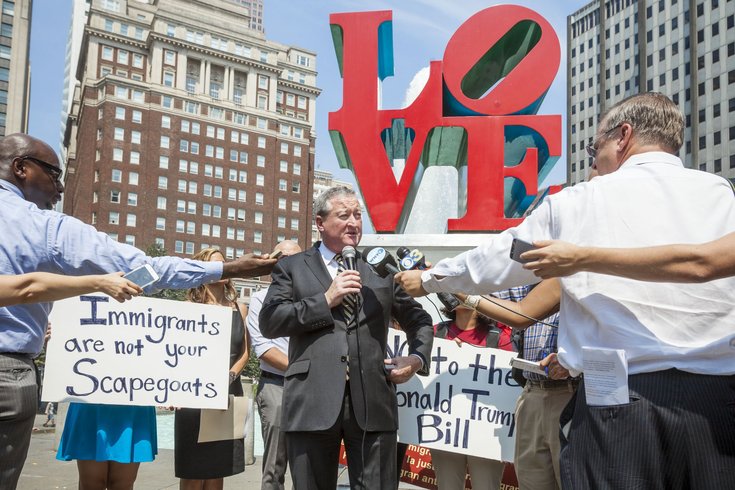
October 18, 2016
 Thom Carroll/PhillyVoice
Thom Carroll/PhillyVoice
Jim Kenney advocates for "sanctuary city" policies during a rally at LOVE Park in July 2015.
Legislation that would impose punishments on Philadelphia for its refusal to cooperate with federal immigration officials passed the Pennsylvania House of Representatives Monday.
With a vote of 136-55, House Bill 1885 has moved to the state Senate. The proposed law would hold Philadelphia liable for damages incurred by criminal activity conducted by unauthorized immigrants, require the city to comply with federal immigration requests and impose penalties for noncompliance.
Republican state Rep. Martina White, who represents part of Northeast Philadelphia, introduced the legislation shortly after Mayor Jim Kenney reinstated Philadelphia's sanctuary city status in January 2016, which was a reversal of a reversal. Shortly before leaving office, former Mayor Michael Nutter undid Philly's sanctuary city status.
In a statement, White said that the support of other Democrats, like Nutter and President Barack Obama's administration, shows the policy is wrong.
“Local officials cannot create their own immigration law,” said White, who made headlines after a heated confrontation with immigration activists in her Harrisburg office earlier this year.
Some Democratic representatives, including Philadelphia's Jordan Harris and Brian Sims, voiced opposition to the bill, which would also require police officers to ask for an arrested individual's immigration papers if the officer had "reasonable cause" to believe the individual was not in the country legally.
Sadly the House passed #hb1885 the "Sanctuary Cities" aka institutionalized racial profiling bill today 136-55.
— Jordan A. Harris (@RepHarris) October 17, 2016
Sims said the bill's language is alarmingly vague and would leave municipalities with large legal bills, and both Sims and Harris suggested that because it's unclear what would cause a police officer to ask for one's immigration papers, it could lead to racial profiling.
Philadelphia isn't the only Pennsylvania municipality with some form of a sanctuary city policy. A 2015 Temple University law school report found that more than 30 counties have similar policies in place, according to the Inquirer.
The policy has drawn fierce criticism from many on both sides of the political divide, but Pennsylvania’s U.S. Sen. Pat Toomey has perhaps been the most vocal opponent. The Republican is currently in a tight re-election campaign against Democrat Katie McGinty and has lambasted his opponent during the race for supporting the policy.
In August, Toomey — a supporter of White's bill — highlighted the case of 45-year-old Honduran national Ramon Aguirre-Ochoa, who was arrested and charged with raping a child in Philadelphia in July.
U.S. Immigration and Customs Enforcement had requested Aguirre-Ochoa be given over by law enforcement when charges against him were dismissed in 2014, but instead he was released under the city's sanctuary city policy. ICE has again requested that Aguirre-Ochoa be turned over following adjudication of local charges.
In a press conference, Toomey said the "heinous" crime Aguirre-Ochoa has been accused of would not have happened if law enforcement had complied with ICE's initial request.
Kenney has stood strong in his support of Philadelphia’s sanctuary city status. His administration said that if ICE would have simply obtained a federal arrest warrant, it could have detained Aguirre-Ochoa for the deportation offense in 2014 without city interference.
Kenney has said that by not doing ICE's job for the agency, the city has a strong relationship with the immigrant community. He was also sharply critical of White's bill when it was introduced, saying that if White thought the bill would actually reduce crime, he has concerns about her "understanding of the law, government and policing."
Kennedy's spokesperson Laurent Hitt said Tuesday that the mayor's position hadn't changed, and that he was "disappointed" the legislation passed the House.
The bill now goes to a GOP-controlled Senate where it is likely to pass and then to the desk of Democratic Gov. Tom Wolf.
Wolf spokesperson Jeff Sheridan wouldn't indicate what the governor's position on the bill is, saying only that he would review it if it reaches his desk.